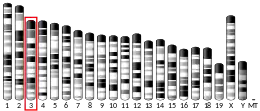HMGCS2
3-hydroxy-3-methylglutaryl-CoA synthase 2 (mitochondrial) is an enzyme in humans that is encoded by the HMGCS2 gene.[5]
The protein encoded by this gene belongs to the HMG-CoA synthase family. It is a mitochondrial enzyme that catalyzes the second and rate-limiting reaction of ketogenesis, a metabolic pathway that provides lipid-derived energy for various organs during times of carbohydrate deprivation, such as fasting, by addition of a third acetyl group to acetoacetyl-CoA, producing HMG-CoA.[6] Mutations in this gene are associated with HMG-CoA synthase deficiency[7] (also known as HMGCS2D), affecting ketone body synthesis.
Alternatively spliced transcript variants encoding different isoforms have been found for this gene.[5]
Occurrence
HMGCS2 is not found in cetaceans, elephantids, or Old World fruit bats.[8]
References
- GRCh38: Ensembl release 89: ENSG00000134240 - Ensembl, May 2017
- GRCm38: Ensembl release 89: ENSMUSG00000027875 - Ensembl, May 2017
- "Human PubMed Reference:". National Center for Biotechnology Information, U.S. National Library of Medicine.
- "Mouse PubMed Reference:". National Center for Biotechnology Information, U.S. National Library of Medicine.
- "Entrez Gene: 3-hydroxy-3-methylglutaryl-CoA synthase 2 (mitochondrial)".
- Drabbe S, Pelzer A, Slenter D, Willighagen E (February 2023). "Disorders in ketone body synthesis (Homo sapiens)". Wiki Pathways.
- Aledo R, Mir C, Dalton RN, Turner C, Pié J, Hegardt FG, et al. (February 2006). "Refining the diagnosis of mitochondrial HMG-CoA synthase deficiency". Journal of Inherited Metabolic Disease. 29 (1): 207–211. doi:10.1007/s10545-006-0214-2. PMID 16601895. S2CID 24866271.
- Jebb D, Hiller M (October 2018). "Recurrent loss of HMGCS2 shows that ketogenesis is not essential for the evolution of large mammalian brains". eLife. 7: e38906. doi:10.7554/eLife.38906. PMC 6191284. PMID 30322448.
External links
- Overview of all the structural information available in the PDB for UniProt: P54868 (Human Hydroxymethylglutaryl-CoA synthase, mitochondrial) at the PDBe-KB.



